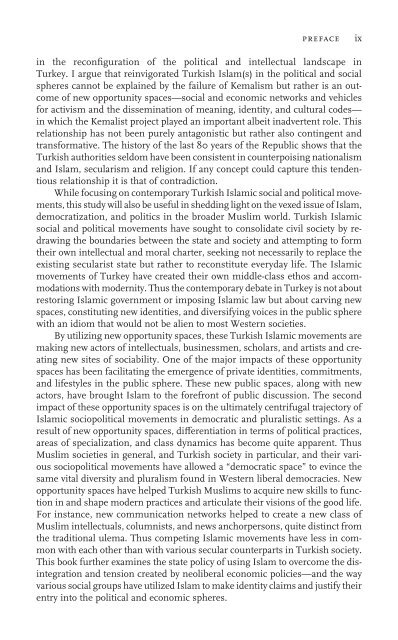You also want an ePaper? Increase the reach of your titles
YUMPU automatically turns print PDFs into web optimized ePapers that Google loves.
prefaceix<strong>in</strong> the reconWguration of the political and <strong>in</strong>tellectual landscape <strong>in</strong><strong>Turkey</strong>. I argue that re<strong>in</strong>vigorated Turkish Islam(s) <strong>in</strong> the political and socialspheres cannot be expla<strong>in</strong>ed by the failure of Kemalism but rather is an outcomeof new opportunity spaces—social and economic networks and vehiclesfor activism and the dissem<strong>in</strong>ation of mean<strong>in</strong>g, identity, and cultural codes—<strong>in</strong> which the Kemalist project played an important albeit <strong>in</strong>advertent role. Thisrelationship has not been purely antagonistic but rather also cont<strong>in</strong>gent andtransformative. The history of the last 80 years of the Republic shows that theTurkish authorities seldom have been consistent <strong>in</strong> counterpois<strong>in</strong>g nationalismand Islam, secularism and religion. If any concept could capture this tendentiousrelationship it is that of contradiction.While focus<strong>in</strong>g on contemporary Turkish <strong>Islamic</strong> social and political movements,this study will also be useful <strong>in</strong> shedd<strong>in</strong>g light on the vexed issue of Islam,democratization, and politics <strong>in</strong> the broader Muslim world. Turkish <strong>Islamic</strong>social and political movements have sought to consolidate civil society by redraw<strong>in</strong>gthe boundaries between the state and society and attempt<strong>in</strong>g to formtheir own <strong>in</strong>tellectual and moral charter, seek<strong>in</strong>g not necessarily to replace theexist<strong>in</strong>g secularist state but rather to reconstitute everyday life. The <strong>Islamic</strong>movements of <strong>Turkey</strong> have created their own middle-class ethos and accommodationswith modernity. Thus the contemporary debate <strong>in</strong> <strong>Turkey</strong> is not aboutrestor<strong>in</strong>g <strong>Islamic</strong> government or impos<strong>in</strong>g <strong>Islamic</strong> law but about carv<strong>in</strong>g newspaces, constitut<strong>in</strong>g new identities, and diversify<strong>in</strong>g voices <strong>in</strong> the public spherewith an idiom that would not be alien to most Western societies.By utiliz<strong>in</strong>g new opportunity spaces, these Turkish <strong>Islamic</strong> movements aremak<strong>in</strong>g new actors of <strong>in</strong>tellectuals, bus<strong>in</strong>essmen, scholars, and artists and creat<strong>in</strong>gnew sites of sociability. One of the major impacts of these opportunityspaces has been facilitat<strong>in</strong>g the emergence of private identities, commitments,and lifestyles <strong>in</strong> the public sphere. These new public spaces, along with newactors, have brought Islam to the forefront of public discussion. The secondimpact of these opportunity spaces is on the ultimately centrifugal trajectory of<strong>Islamic</strong> sociopolitical movements <strong>in</strong> democratic and pluralistic sett<strong>in</strong>gs. As aresult of new opportunity spaces, diVerentiation <strong>in</strong> terms of political practices,areas of specialization, and class dynamics has become quite apparent. ThusMuslim societies <strong>in</strong> general, and Turkish society <strong>in</strong> particular, and their varioussociopolitical movements have allowed a “democratic space” to ev<strong>in</strong>ce thesame vital diversity and pluralism found <strong>in</strong> Western liberal democracies. Newopportunity spaces have helped Turkish Muslims to acquire new skills to function<strong>in</strong> and shape modern practices and articulate their visions of the good life.For <strong>in</strong>stance, new communication networks helped to create a new class ofMuslim <strong>in</strong>tellectuals, columnists, and news anchorpersons, quite dist<strong>in</strong>ct fromthe traditional ulema. Thus compet<strong>in</strong>g <strong>Islamic</strong> movements have less <strong>in</strong> commonwith each other than with various secular counterparts <strong>in</strong> Turkish society.This book further exam<strong>in</strong>es the state policy of us<strong>in</strong>g Islam to overcome the dis<strong>in</strong>tegrationand tension created by neoliberal economic policies—and the wayvarious social groups have utilized Islam to make identity claims and justify theirentry <strong>in</strong>to the political and economic spheres.




